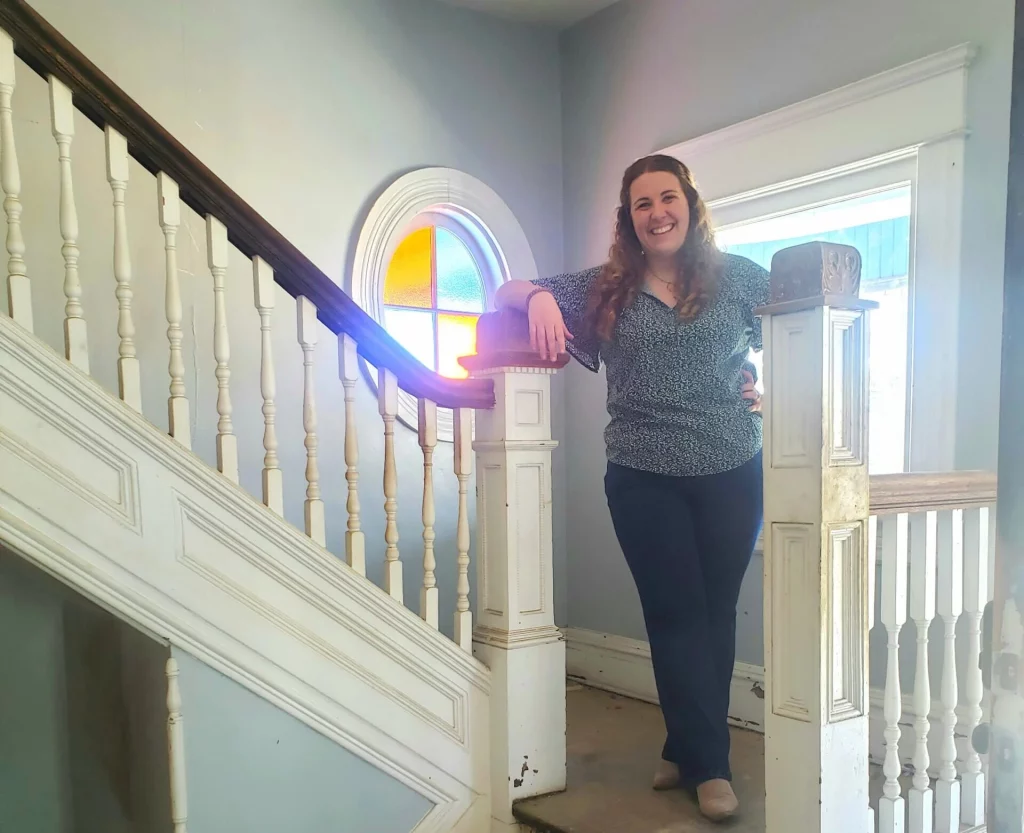SALISBURY — Rachel Fink is building up additional responsibilities at the Historic Salisbury Foundation as she serves as office manager and revolving fund project manager and can now officially begin operating in North Carolina as a general contractor for residential projects.
Not a stranger to the world of contracting, Fink was exposed to it during her middle and high school years as she said her dad bought and sold houses, and she and her brother always used to help work with him, learning a lot in the process. Her exposure and building up more knowledge continued when she, her husband and dad worked on the Fink’s first house, one that had been built in 1875.
They spent evenings and weekends for two years working on the house, she said, having since sold it. Through it, she gained more hands-on experience and, she said, is looking to build their own home.
When buying this first house, she said, is when “I developed a passion for historic homes,” plus, she added, to be “able to use those skills in my job is exciting.”
When she first began, Fink said she was part time, becoming full time in January and at that time, set a goal of having her license by March 31. She began the process of studying for it in November and started in earnest at the beginning of the year.
Fink said she didn’t necessarily know she would try to become a residential contractor. “That kind of came about.” Prior to getting her license and adding this new responsibility at work, she said she was spread out all over the place, and her focus wasn’t on just one particular area. She spoke about this with her boss, Kimberly Stieg, executive director of the foundation, and because they were looking for someone to do this particular job, Stieg posed a “well, what if….” scenario to her.
Fink said, “As far as a financial standpoint goes as a nonprofit, we were trying to do everything that we can to make the money go the furthest. It is financially straining for us to hire general contractors all the time, and so this made sense for us. It made sense for me.”
Her journey of becoming a residential contractor included her application being accepted, being given a code to take it, going to a PSI testing site in Charlotte to take the test, which she passed and approval by the licensing board and sending it to her. That, she said, has been a huge accomplishment. “It was kind of one of those things that everything I have learned is actually coming to fruition,” she said.
Commenting on Fink’s new role, Stieg said, “HSF has never had anyone in this specific interactive role before, and it’s a big deal and means so much toward HSF fulfilling our mission to preserve, protect and revitalize the historic fabric of Salisbury and Rowan County.”
She said that in addition to performing her administrative duties, Fink will oversee all of the historic home stabilization/restoration projects.
Fink “does an amazing job with our daily operations and no doubt will continue being a wonderful asset with her newly designated responsibilities,” which, she said will range from hiring and managing subcontractors, assisting with hands-on demolition, meeting with homeowners to provide resources for maintaining their historic home, and inspecting and monitoring HSF’s 110 revolving fund properties on an annual basis.
As for the organization, for Fink to take on this role, she said, brings the restoration process, while they have always overseen it by getting contractors to handle work, now “brings it a little bit more in-house.”
She shared that she works with Revolving Fund Chair Dylan Ellerbee, who is also a board member and just recently became a general contractor as well.
“So, now we are going into this a lot more prepared,” she added. There was a time when they didn’t have as many projects taking place, and “now we feel equipped to take on more. And that’s huge, Fink said. (It) should help us be able, instead of taking on one a year, take on five a year. That is something that seems possible,” noting they have saved more than 100 properties so far. “We are just able to keep rolling and get things handled and hire who we need to hire and pull the permits we need to and get it all done,” she said.
When speaking about her role as revolving fund project manager, Fink said that she and Ellerbee work together to oversee the projects noting that she handles more of the finances and the people who are in the revolving fund and following up with the homeowners. She said that he works more on the projects they are working on, which she also helps with as well.
The revolving fund, she explained, is the “mechanism that Historic Salisbury Foundation uses, as they buy houses, stabilize them, sell them, give protective covenants, or we have people donate houses and we do the same thing.” The protective covenants, which are attached to the deed, basically outlines what needs to happen with the house, she said, for example if a house has stained woodwork, it remains that way, and can’t be painted or if the floors are hardwood, they are to remain hardwood. “Fully understanding the entire preservation process and the inner workings of a nonprofit organization allows Rachel to bring such a unique blend of talent to this position, and we are extremely proud of her accomplishments,” Stieg said. “She’s a dynamic member of our team.”

